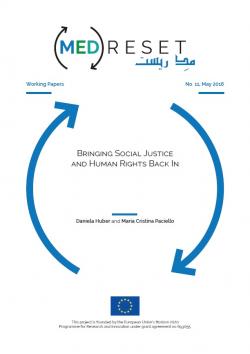Bringing Social Justice and Human Rights Back In
This report contrasts how European institutional and civil society stakeholders “talk and practice” the Mediterranean into being. Based on extensive stakeholder consultations, it tends to confirm the finding of MEDRESET Work Package 1, namely that EU institutions construct the Mediterranean through three discursive practices: the Mediterranean as a space crucial for EU interests, as a dangerous space and as a diverse geopolitical space. In stark difference to this institutional imaginary, European civil society and grassroots actors are constructing the Mediterranean space through three different discursive practices, namely the Mediterranean as a space in which universal values are being violated; as a space that is economically, but not geopolitically or ideationally, dominated by the EU; and as one where civic space is shrinking and xenophobia, authoritarianism and “wall politics” are prevailing. To rebuild an equal Mediterranean space and a flexible, inclusive and responsive EU role in it, European stakeholders suggest two policy alternatives: a policy of social justice and human rights, and a policy of reconciliation.
-
Details
Rome, IAI, May 2018, 23 p. -
In:
-
Issue
Working Paper 11
Introduction
1. Methodology
2. Contextual and Interview Analysis
2.1 Security and Stability versus Rights and Needs
2.2 A “Region of Failures” versus “EU Hypocrisy”
2.3 Old Recipes versus the Need for a Shared New Model
2.3.1 Substance
2.3.2 Actors
2.3.3 External Powers
2.3.4 Instruments
2.4 Alternatives
2.4.1 A Policy of Social Justice and Human Rights
2.4.2 A Policy of Reconciliation
Conclusions
References
Annex: List of Interviewees



